Francis Bacon 培根作品简介
Francis Bacon 培根作品简介

Francis Bacon and His WorksFrancis BaconFrancis Bacon(1561—1626)was one of the leading figures in natural philosophy and in the field of scientific methodology in the period of transition from the Renaissance to the early modern era.He studied at Cambridge (Trinity College) and Gray's Inn, entered Parliament, and gradually established his reputation, but made little progress during Elizabeth's reign.WorksFrancis Bacon left vast and varied writings, which might be divided into three great branches:Scientifical works — in which his ideas for an universal reform of knowledge, scientific method and the improvement of mankind's state are presented.Religious/literary works — in which he presents his moral philosophy and theological meditations. Juridical works — in which his reforms in Law are proposed.ContributionsFrancis Bacon had made great contributions on Literature, Philosophy, Science, law and art. Literature:Francis Bacon’s literatur al work mostly are proses and essays. There are some features of Bacon's essays: ①the language is very neat, pretty and weighty. ②the sentences are very short. Bacon also likes to use more co-ordinate conjunctions than the subordinated ones, such as "as, since, because". ③the devices are parallelism, epigrams(警句), metaphor,and simile.And his most important work is Essay, which was regarded as one of the greatest prose works in the world for its brevity, compactness and powerfulness. Essay covers a wide variety of subjects, such as love, truth, friendship, politics, economy, religion, beauty, studies, and marriage.Of TruthⅠ Brief Introduction●First published in 1625●Francis Bacon declares that truth in the philosophical and theological sense, as well as honesty in thecivil business sense, are the "sovereign good of human nature."Ⅱ Background Information“What is truth?” said jesting Pilate (Full name: Pontius Pilate)●According to the new testament scripture, at first, Pilate thinks Jesus is innocent, for he had questionedJesus for many times. But under the pressure of the jewish religious leaders, Jesus was sentenced to death.●In the conversation between Pilate and Jesus, Pilate asked,''what have you done?'' Then, Pilateasked:“What is truth?”●Actually Pilate knew Jesus was innocent but he still asked , “What is truth” . At that time a lot of peoplelike Pilate, they do know what is truth but they pretend they don’t know .●Bacon uses this Bible story to introduce his topic——truth. He wants to tell people what is truth andwhat attitude should we take towards truth.Ⅲ TopicThe inquiry of truth, which is the love-making or wooing of it, the knowledge of truth, which is the presence of it, and the belief of truth, which is the enjoying of it, is the sovereign good of human nature.Ⅳ Sentences Analysis1. “But it is not only the difficulty and labor, which men take in finding out of truth, nor again, that when it is found, it imposeth upon men's thoughts, that doth bring lies in favor; but a natural though corrupt love, of the lie itself.”●Up to this point Bacon is saying there are few philosophical skeptics left but humans still prefer thefreedom to choose their own views over the hard work of pursuing truth especially since they consider truth constricting.2. No advantageBacon writes “One of the later school of the Grecians, examineth the matter, and is at a stand, to think what should be in it, that men should love lies; where neither they make for pleasure, as with poets, nor for advantage, as with the merchant; but for the lie's sake.”3. AdvantagesBacon writes “A mixture of a lie doth ever add pleasure. Doth any man doubt, that if there were taken out of men's minds, vain opinions, flattering hopes, false valuations, imaginations as one would, and the like”4. DisadvantagesBacon writes “but it would leave the minds, of a number of men, poor shrunken things, full of melancholy and indisposition, and unpleasing to themselves?”5. “truth, which only doth judge itself, teacheth that the inquiry of truth, which is the love-making, or wooing of it,”●“yet truth, which only doth judge itself” means that “that truth seeking faculty is the sole judge of truth.”●In “the love-making, or wooing of it” Bacon means the happy match between the mind of man and thenature of things.”6. “The first creature of God, in the works of the days, was the light of the sense; the last, was the light of reason.”●Bacon believed that God gave us our senses to determine truth be he also believed God gave us theability to reason to determine truth.Ⅴ Beautiful Sentences1.But I cannot tell; this same truth, is a naked, and open day-light, that doth not show the masks, and mummeries, and triumphs, of the world, half so stately and daintily as candle-lights.余亦难言究竟,唯思真理犹如白日无遮之光,直照人世之歌舞庆典,不如烛光掩映,反能显其堂皇之美。
弗朗西斯·培根

弗朗西斯·培根
弗朗西斯·培根(Francis Bacon,1561年1月22日-1626年4月9日),英国文艺复兴时期著名的哲学家、政治家和作家。
他被认为是现代科学实证主义的奠基者之一,也
是英国启蒙运动的重要代表人物之一。
培根出生于英格兰,是伊丽莎白一世时期的律师、政治家和哲学家。
他接受了良好的
教育,曾在剑桥大学学习法律,后来又进入枢密院工作,并成为国王詹姆斯一世的国务大臣。
他曾任伦敦法学院院长、国王特许会计师和特许枢密院律师,因此在政治和法律领域
都有很高的地位。
作为哲学家和作家,培根以其丰富的学识和深厚的思想而闻名。
他的主要作品包括
《新工具》、《论谈》和《科學進攻》等。
他在这些著作中提出了自己独特的哲学观点,
主张通过实证方法来获取知识,并强调观察和实验在科学研究中的重要性。
他还对政治、
宗教和教育等问题进行了深刻的思考,对当时社会的发展和变革提出了许多有益的建议。
培根的科学哲学对后世产生了巨大的影响。
他的实证主义思想为现代科学方法论的发
展奠定了基础,启发了众多科学家和哲学家进行科学研究,并对人类的认识和理解产生了
深远的影响。
他也为政治和社会改革提供了许多有价值的思想,成为了英国启蒙运动的代
表人物之一。
弗朗西斯·培根是一位杰出的思想家和作家,他对科学、哲学和社会问题的深刻洞察
和独特见解使他成为了文艺复兴时期最杰出的人物之一,其影响力不仅限于他所处的时代,而是一直影响到了今天。
《培根随笔》简介
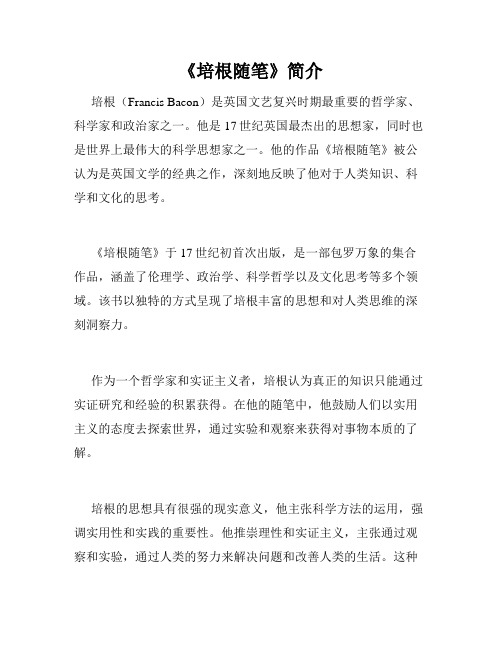
《培根随笔》简介培根(Francis Bacon)是英国文艺复兴时期最重要的哲学家、科学家和政治家之一。
他是17世纪英国最杰出的思想家,同时也是世界上最伟大的科学思想家之一。
他的作品《培根随笔》被公认为是英国文学的经典之作,深刻地反映了他对于人类知识、科学和文化的思考。
《培根随笔》于17世纪初首次出版,是一部包罗万象的集合作品,涵盖了伦理学、政治学、科学哲学以及文化思考等多个领域。
该书以独特的方式呈现了培根丰富的思想和对人类思维的深刻洞察力。
作为一个哲学家和实证主义者,培根认为真正的知识只能通过实证研究和经验的积累获得。
在他的随笔中,他鼓励人们以实用主义的态度去探索世界,通过实验和观察来获得对事物本质的了解。
培根的思想具有很强的现实意义,他主张科学方法的运用,强调实用性和实践的重要性。
他推崇理性和实证主义,主张通过观察和实验,通过人类的努力来解决问题和改善人类的生活。
这种思想对于当时的科学发展和人类文明的进步起到了积极的推动作用。
《培根随笔》的内容广泛而深刻,涉及政治、伦理、教育、科学等多个领域。
在政治方面,培根强调国家的发展离不开优秀的领导者和有效的政府管理。
他提出了政府应该聚焦于公共利益,以实际行动来服务于人民。
在伦理学方面,他探讨了个人道德行为和社会道德规范之间的关系,强调个人品德的重要性。
在教育方面,培根主张培养全面发展的人才,注重培养人的思辨能力和创新能力。
在科学方面,他强调实验方法的重要性,主张通过实验来验证和丰富人类的知识。
总的来说,《培根随笔》凝聚了培根丰富的思想和对人类生活的深刻思考,为人们提供了关于科学、伦理、教育和政治等重要领域的启示。
这本书不仅对于17世纪的英国文化产生了巨大的影响,也对后世的人类思想和文化发展产生了深远的影响。
尽管《培根随笔》的出版时间已经有几个世纪了,但其中的思想和观点仍然具有重要的现实意义。
作为读者,我们可以从中汲取智慧,启迪我们的思维,为我们的生活和社会做出积极的贡献。
培根随笔作品简介
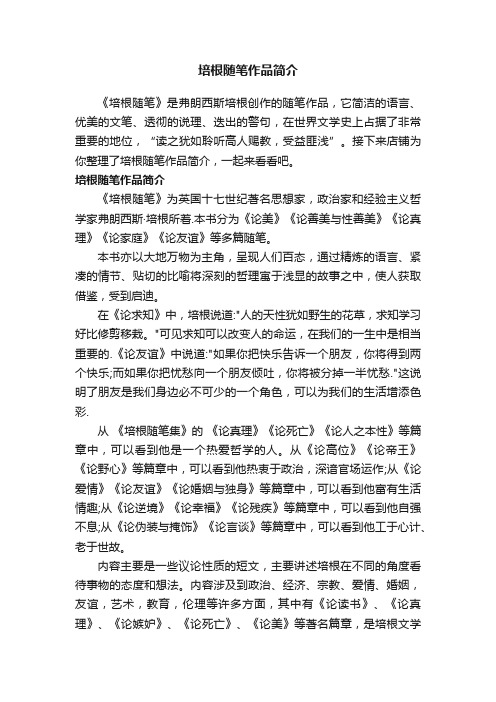
培根随笔作品简介《培根随笔》是弗朗西斯培根创作的随笔作品,它简洁的语言、优美的文笔、透彻的说理、迭出的警句,在世界文学史上占据了非常重要的地位,“读之犹如聆听高人赐教,受益匪浅”。
接下来店铺为你整理了培根随笔作品简介,一起来看看吧。
培根随笔作品简介《培根随笔》为英国十七世纪著名思想家,政治家和经验主义哲学家弗朗西斯·培根所着.本书分为《论美》《论善美与性善美》《论真理》《论家庭》《论友谊》等多篇随笔。
本书亦以大地万物为主角,呈现人们百态,通过精炼的语言、紧凑的情节、贴切的比喻将深刻的哲理寓于浅显的故事之中,使人获取借鉴,受到启迪。
在《论求知》中,培根说道:"人的天性犹如野生的花草,求知学习好比修剪移栽。
"可见求知可以改变人的命运,在我们的一生中是相当重要的.《论友谊》中说道:"如果你把快乐告诉一个朋友,你将得到两个快乐;而如果你把忧愁向一个朋友倾吐,你将被分掉一半忧愁."这说明了朋友是我们身边必不可少的一个角色,可以为我们的生活增添色彩.从《培根随笔集》的《论真理》《论死亡》《论人之本性》等篇章中,可以看到他是一个热爱哲学的人。
从《论高位》《论帝王》《论野心》等篇章中,可以看到他热衷于政治,深谙官场运作;从《论爱情》《论友谊》《论婚姻与独身》等篇章中,可以看到他富有生活情趣;从《论逆境》《论幸福》《论残疾》等篇章中,可以看到他自强不息;从《论伪装与掩饰》《论言谈》等篇章中,可以看到他工于心计、老于世故。
内容主要是一些议论性质的短文,主要讲述培根在不同的角度看待事物的态度和想法。
内容涉及到政治、经济、宗教、爱情、婚姻,友谊,艺术,教育,伦理等许多方面,其中有《论读书》、《论真理》、《论嫉妒》、《论死亡》、《论美》等著名篇章,是培根文学方面的代表作,语言简洁文笔优美,说理透彻,警句迭出,蕴含着培根的思想精华。
培根随笔作品名言人生只知哲学一些皮毛的人,思想会导向无神论。
培根随笔内容简介
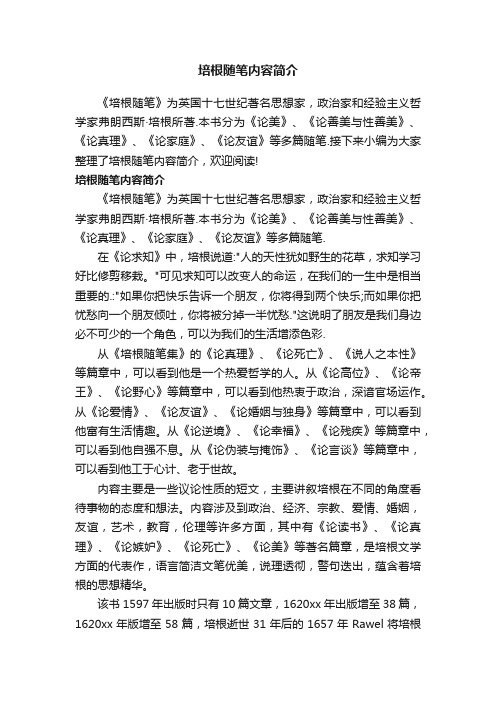
培根随笔内容简介《培根随笔》为英国十七世纪著名思想家,政治家和经验主义哲学家弗朗西斯·培根所著.本书分为《论美》、《论善美与性善美》、《论真理》、《论家庭》、《论友谊》等多篇随笔.接下来小编为大家整理了培根随笔内容简介,欢迎阅读!培根随笔内容简介《培根随笔》为英国十七世纪著名思想家,政治家和经验主义哲学家弗朗西斯·培根所著.本书分为《论美》、《论善美与性善美》、《论真理》、《论家庭》、《论友谊》等多篇随笔.在《论求知》中,培根说道:"人的天性犹如野生的花草,求知学习好比修剪移栽。
"可见求知可以改变人的命运,在我们的一生中是相当重要的.:"如果你把快乐告诉一个朋友,你将得到两个快乐;而如果你把忧愁向一个朋友倾吐,你将被分掉一半忧愁."这说明了朋友是我们身边必不可少的一个角色,可以为我们的生活增添色彩.从《培根随笔集》的《论真理》、《论死亡》、《说人之本性》等篇章中,可以看到他是一个热爱哲学的人。
从《论高位》、《论帝王》、《论野心》等篇章中,可以看到他热衷于政治,深谙官场运作。
从《论爱情》、《论友谊》、《论婚姻与独身》等篇章中,可以看到他富有生活情趣。
从《论逆境》、《论幸福》、《论残疾》等篇章中,可以看到他自强不息。
从《论伪装与掩饰》、《论言谈》等篇章中,可以看到他工于心计、老于世故。
内容主要是一些议论性质的短文,主要讲叙培根在不同的角度看待事物的态度和想法。
内容涉及到政治、经济、宗教、爱情、婚姻,友谊,艺术,教育,伦理等许多方面,其中有《论读书》、《论真理》、《论嫉妒》、《论死亡》、《论美》等著名篇章,是培根文学方面的代表作,语言简洁文笔优美,说理透彻,警句迭出,蕴含着培根的思想精华。
该书1597年出版时只有10篇文章,1620xx年出版增至38篇,1620xx年版增至58篇,培根逝世31年后的1657年Rawel将培根未完成的随笔《论谣言》作为第59篇收入最终构成了今天流行的版本。
培根散文选
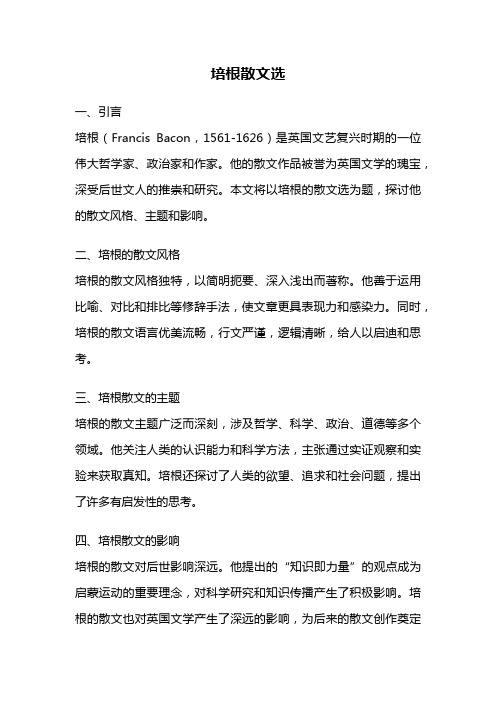
培根散文选一、引言培根(Francis Bacon,1561-1626)是英国文艺复兴时期的一位伟大哲学家、政治家和作家。
他的散文作品被誉为英国文学的瑰宝,深受后世文人的推崇和研究。
本文将以培根的散文选为题,探讨他的散文风格、主题和影响。
二、培根的散文风格培根的散文风格独特,以简明扼要、深入浅出而著称。
他善于运用比喻、对比和排比等修辞手法,使文章更具表现力和感染力。
同时,培根的散文语言优美流畅,行文严谨,逻辑清晰,给人以启迪和思考。
三、培根散文的主题培根的散文主题广泛而深刻,涉及哲学、科学、政治、道德等多个领域。
他关注人类的认识能力和科学方法,主张通过实证观察和实验来获取真知。
培根还探讨了人类的欲望、追求和社会问题,提出了许多有启发性的思考。
四、培根散文的影响培根的散文对后世影响深远。
他提出的“知识即力量”的观点成为启蒙运动的重要理念,对科学研究和知识传播产生了积极影响。
培根的散文也对英国文学产生了深远的影响,为后来的散文创作奠定了基础。
五、培根散文的代表作品1.《论学问》:培根在这篇散文中探讨了学问的本质和目的,提出了实证主义的观点,强调实践和实验的重要性。
2.《真理之镜》:这是培根的一篇科学哲学散文,他在文章中阐述了观察和实验的重要性,强调科学研究应该基于客观事实。
3.《论富贵》:这篇散文探讨了财富和地位对人们的影响,培根主张追求真正的内在价值和品质,而非物质的追求。
4.《论友谊》:培根在这篇散文中讨论了友谊的意义和价值,他认为真正的友谊应该建立在互相尊重和信任的基础上。
5.《论德行》:这篇散文探讨了德行的重要性和人类行为的道德准则,培根呼吁人们要追求高尚的品德和道德行为。
六、结语培根的散文选是英国文学的珍宝,他的散文风格简明扼要、思想深刻,对后世的影响深远。
通过研究培根的散文,我们可以更好地理解他的思想和观点,从中汲取智慧和启示。
培根的散文选是一部值得阅读和研究的经典之作。
战后最有争议画家丨弗朗西斯·培根高清作品集

战后最有争议画家丨弗朗西斯·培根高清作品集弗朗西斯·培根Francis Bacon1909年10月28日-1992年4月28日弗朗西斯·培根(Francis Bacon,1909-1992年),是一位生于爱尔兰的英国画家。
其作品以粗犷,犀利,具强烈暴力与噩梦般的图像著称,他扭曲、变形和模糊的人物画使他成为战后最有争议的画家之一。
培根出生于爱尔兰都柏林一个英格兰人家庭。
16岁时他离开家,居于柏林和巴黎,直到1929年定居伦敦开始接触油画,同时不断实验水彩画与素描。
在此期间的作品有机而怪异,具有超现实主义的特色,不过一直都默默无闻。
1943年一1944年,由于身体的原因而不能服军役。
培根把所有精力都放在绘画活动上,成为了一名职业的画家。
他是自学成才的画家。
他的早期作品受到超现实主义的影响。
1945年当他的三联画《三张十字架底下人物的素描》在伦敦展出后,他受到了广泛注意。
培根几乎全靠自学,运用多变的技法表现各种恐怖、愤怒和兴奋的形象。
他最擅长运用粗犷强劲的笔触来表现画面中人物的恐怖、荒蛮、孤寂、兴奋和愤怒。
培根的笔触中隐含着内心的想象和情绪,虽然人物的形象被肢解甚至扭曲,但依然保持着可以辨认的形象。
在培根的笔下,形象不再是再现的重复,而是向人们展现了命运真实的面目。
培根形容自己的作品是“试图把某种情绪形象化”。
他喜欢表现孤独和苦恼的主题。
他所绘制的人物在画面上变成了令人不适一种恐怖,巨大的苦痛感撞击着观者的心灵。
正是这种敢于直视内心感受,毫不介意地表现在公众视野当中,引起了人们的内心关注,也让当时的画坛为之震撼。
人们把他的作品与戈雅的奇妙作品相媲美。
自从培根死后,其声誉与知名度逐步提高。
他的作品获得大众的敬仰和等量的排斥。
Francis bacon
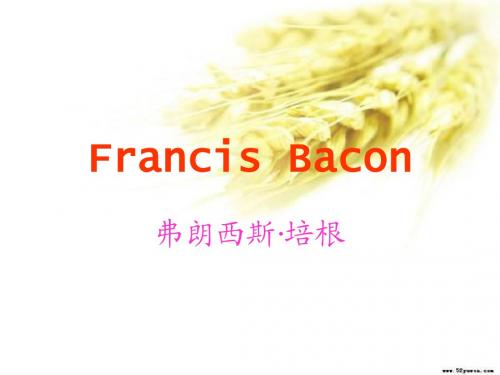
弗朗西斯· 培根
代表品
• • • • • 《新工具论》,1620年 《学术的进展》,1605年 《论说文集》,1624年 《各家哲学的批判》 《 培根人生论》
培根人生论
1597年,《培根人生论》在英国首版后, 即以文笔优美、语句简洁、趣味隽永、格 言精妙而大受欢迎,多次再版重印,历四 百多年而未衰,被译为世界上几乎所有文 字。2000年还被美国公众评选为最受喜爱 的十本著作之一。它与《蒙田随笔》、 《帕斯卡尔思想录》一起,被人们誉为欧 洲近代哲理散文三大经典。
评论
• <培根人生论 >属于为数不多的应当咀嚼消 化的书。你很难见到在这么小一个盘子里 盛这么多肉, 而且烹制得如此色、香、味 俱全 。 ----威尔.杜兰特 • 培根是一个兴趣广泛的人,有文艺复兴之 风,他以《培根人生论》闻名于世。 ----贝兰特.罗素
《培根随笔》赏析
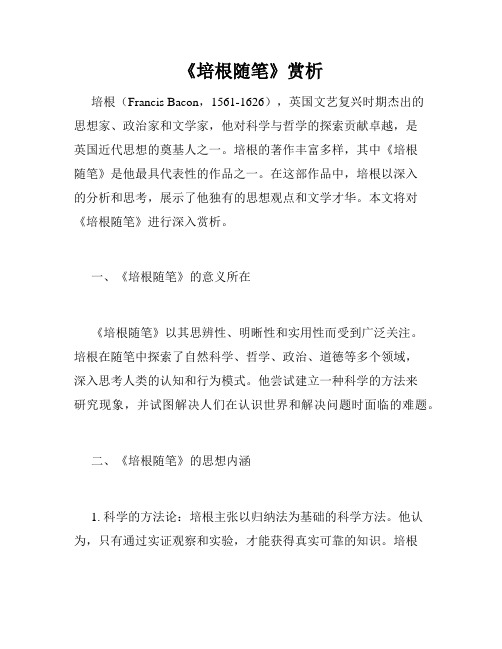
《培根随笔》赏析培根(Francis Bacon,1561-1626),英国文艺复兴时期杰出的思想家、政治家和文学家,他对科学与哲学的探索贡献卓越,是英国近代思想的奠基人之一。
培根的著作丰富多样,其中《培根随笔》是他最具代表性的作品之一。
在这部作品中,培根以深入的分析和思考,展示了他独有的思想观点和文学才华。
本文将对《培根随笔》进行深入赏析。
一、《培根随笔》的意义所在《培根随笔》以其思辨性、明晰性和实用性而受到广泛关注。
培根在随笔中探索了自然科学、哲学、政治、道德等多个领域,深入思考人类的认知和行为模式。
他尝试建立一种科学的方法来研究现象,并试图解决人们在认识世界和解决问题时面临的难题。
二、《培根随笔》的思想内涵1. 科学的方法论:培根主张以归纳法为基础的科学方法。
他认为,只有通过实证观察和实验,才能获得真实可靠的知识。
培根反对基于信仰和偏见的主观判断,强调理性思维和客观分析在科学研究中的重要性。
2. 真理与追求:培根强调追求真理的重要性,并提出了“知识即力量”的观点。
他认为,人类通过不断扩展知识的边界,才能实现对世界的掌控和改造。
同时,培根也对追求真理的过程进行了思考,指出人们常常受到偏见、傲慢和贪婪的影响,这些因素会阻碍人们对真理的认知。
3. 社会改革的理念:培根关注社会问题,提出了一些改革的思想。
他主张以人的福祉为中心,反对专制和腐败,主张推行社会公正和法制建设。
同时,培根也强调了教育的重要性,认为只有通过教育和知识普及,人们才能提高自己的素质和创造力,为社会进步做出贡献。
三、《培根随笔》的文学价值1. 写作风格:培根的写作风格简练明了,语句通顺,思路清晰。
他运用丰富的修辞手法和比喻,将抽象的概念和理论转化为形象生动的语言,使读者易于理解和接受。
2. 文学形式:《培根随笔》以短文的形式呈现,每篇短文都展示了培根独特的思考方式和观点。
这种形式使得读者可以选择感兴趣的话题进行阅读,同时也方便读者随时回顾和思考其中的观点。
《培根人生论》简介

《培根人生论》简介培根人生论简介《培根人生论》是英国哲学家弗朗西斯·培根的一部重要著作,是近代西方哲学史上的里程碑之一。
这本书以其深邃的思考和独特的观点对人生、知识和科学进行了全面而深入的阐述。
本文将对《培根人生论》进行简要介绍,以帮助读者更好地理解和欣赏这部经典之作。
一、著者简介弗朗西斯·培根(1561-1626),英国文艺复兴时期最重要的哲学家、科学家和政治家之一。
他是英国法律体系的奠基人之一,也是实验科学方法的倡导者。
培根还积极推动科学发展,强调实证观察和理性推理的重要性,因此被誉为现代科学方法的奠基人之一。
二、《培根人生论》的内容与主题《培根人生论》是培根在其哲学著作《新工具》的基础上进一步发展而成的一部思想巨著。
这本书以人的根本问题为中心,探讨了人生的本质、人的认识能力以及人的理性思维的局限性等重要议题。
培根通过对人类的思维方法和知识体系的批判,提出了实证主义的观点,主张建立起符合经验和观察的有效知识体系,以推动科学的进步和人类的福祉。
他认为人类的认识能力有限而容易受到错误和偏见的影响,因此,通过实验和观察可以消除认识上的误区,得出更加准确的结论。
此外,培根还强调了科学研究的重要性和科学实践的价值。
他提出了“知识即权力”的理念,认为科学的发展可以为人类社会带来更多的力量和进步。
他呼吁人们用实证的方法来解决现实问题,以实现人类社会的发展和进步。
三、《培根人生论》对后世的影响《培根人生论》在出版后引起了广泛的反响,并对后世产生了深远影响。
它对科学哲学、认识论以及科学研究方法的发展产生了重大影响。
首先,培根强调了实证主义的观点,提出了通过实验和观察来获取知识的方法,这种方法也成为后来科学思维的基础。
其次,培根对科学的重要性和科学实践的价值进行了充分的阐述,促使人们开始重视实证主义的思想,并推动了科学的发展。
他的观点使人们逐渐认识到科学可以为社会带来更多的福祉和进步。
最后,培根的认识论观点对人们的思维方式和逻辑思维产生了重要的影响。
英国画家培根作品

英国画家培根作品英国画家弗朗西斯•培根(Francis Bacon,l909--1992)具有广阔的文化背景,研究过尼采著作、样式主义和浪漫主义的绘画,并深受北欧怪诞风格画家的影响。
他习惯使用人物形象作为图画设计的基础,并使画中可视世界的物体和场景带上感情色彩。
他常从过去大师的画中选材,然而他对这些题材的态度受制于个人经验和内在的极度痛苦,这是一种幻灭的、兽性的恐怖感情,反映了当代都市生活的精神危机。
他仿照委拉士开兹的《教皇英诺森十世》画了一系列仿教皇肖像的习作,如《保罗二世》(1951),这是一个歇斯底里的暴行的形象,试图给人一种残酷和暴力的印象。
一个全身沾满血迹的人躺在床上。
一只被屠宰的动物身上被夹牢的部位。
一个坐在椅子上狠狠抽烟的人……当我们在欣赏弗朗西斯•培根(Francis Bacon)的作品时,就好像走过一栋巍峨的建筑物。
一个身体被扭曲的人蜷曲在座位上。
一个手持剃刀的人和一个在大便的人……我们在画中所看到的影像和事件,到底有什么意义?关于我们所见到的影像,象征着什么意义?画中的形像是那么漠不关心其它人的存在或处境。
当我们看这些图画时,我们是同样的想法吗?从一张画家本人的照片中,我们发现卷起袖子露出手臂的画家几乎和他所创作出来的画中人极为相似。
一个妇人像孩子般在轨道上匍匐前进。
根据一九七一年法国的《艺术鉴赏杂志》(Connaissance des Arts)指出,弗朗西斯•培根已经可以名列当今十大重要画家之首。
一个裸体的男人坐在椅子上,脚边堆满破报纸。
一个男人双眼直瞪着空白的窗帘,或者是一个穿背心的男人斜 在脏 的红色沙发上……培根的作品里有许多活动中的人,而他们的动作和姿势都带有一种痛苦的感受。
之前,从来没有人这样画过,而这样的视觉经验显然与我们生存的真实世界有关,至于其中到底有什么关连,我们可以根据以下几件事实来加以探讨:1.弗朗西斯•培根是本世纪唯一的一位享誉国际且具影响力的英国画家。
弗朗西斯

弗朗西斯·培根(英国文艺复兴时期散文家、哲学家)弗朗西斯·培根(Francis Bacon,1561一1626年),第一代圣阿尔本子爵(1st Viscount St Alban),英国文艺复兴时期散文家、哲学家。
英国唯物主义哲学家,实验科学的创始人,是近代归纳法的创始人,又是给科学研究程序进行逻辑组织化的先驱。
主要著作有《新工具》、《论科学的增进》以及《学术的伟大复兴》等。
培根12岁入剑桥大学,后担任女王特别法律顾问以及朝廷的首席检察官、掌玺大臣等。
晚年,受宫廷阴谋逐出宫廷,脱离政治生涯,专心从事学术研究和著述活动,写成了一批在近代文学思想史上具有重大影响的著作,其中最重要的一部是《伟大的复兴新工具论》。
另外,他以哲学家的眼光,思考了广泛的人生问题,写出了许多形式短小、风格活泼的随笔小品,集成《培根随笔》。
1626年3月底,培根由于身体孱弱,在实验中遭受风寒,支气管炎复发,病情恶化。
1626年4月9日清晨病逝约翰·洛克(英国哲学家)约翰·洛克(John Locke,1632年8月29日-1704年10月28日),英国的哲学家。
在知识论上,洛克与乔治·贝克莱、大卫·休谟三人被列为英国经验主义(British Empiricism)的代表人物,但他也在社会契约理论上做出重要贡献。
他发展出了一套与托马斯·霍布斯的自然状态不同的理论,主张政府只有在取得被统治者的同意,并且保障人民拥有生命、自由和财产的自然权利时,其统治才有正当性。
洛克相信只有在取得被统治者的同意时,社会契约才会成立,如果缺乏了这种同意,那么人民便有推翻政府的权利。
洛克的思想对于后代政治哲学的发展产生巨大影响,并且被广泛视为是启蒙时代最具影响力的思想家和自由主义者。
他的著作也大为影响了伏尔泰和卢梭,以及许多苏格兰启蒙运动的思想家和美国开国元勋。
他的理论被反映在美国的独立宣言上。
培根

摘要《培根随笔》是英国随笔文学的开山之作,在世界文学史上占据了非常重要的地位,本书作品创作于1597年一1625年,内容主要涉及三个方面的论题:(1)人与世界及社会的关系;(2)人与自身的关系;(3)人与上帝、宗教的关系。
文章不受个人情感支配,格调公正超脱,篇篇言简意赅而富于变化,文章紧凑,脉络分明,逻辑清晰,用词精当准确,比喻通俗易懂。
而本篇《论真理》的“探求真理——向它求爱,认识真理——与它同在,信仰真理——为它而乐,毕竟是人性中最崇高的美德。
”,这是培根这位两百多年前的先贤告诉我们对待真理时应该有的态度。
真理是我们的归宿,是我们本身,亦是我们应该具有的信仰。
本文拟从几方面对《论真理》的两个中文译本进行比较。
所选取的分别是水天同和曹明伦的译本。
通过比较我们可以发现,随着语言的丰富和发展,以及对译本知识的了解,当代的译本更具有可读性,因为它更好地传达了培根散文的风格,即语言优美、词句凝练、寓意深刻。
关键词:风格;真理;信仰AbstractEssay is a British pioneer for the essay in the history of world literature, and it occupies a very important position, the book was composed in 1597 a 1625, mainly deals with three aspects of the topics: (1) the relationship between people, society and the world; (2) the relationship between people and themselves; (3) the relationship between man, God and religion. Articles are all detached with personal emotion, but with style of justice. Every piece of writing is concise and full of change, the article is compact, context, logic and venation is clear, and words are appropriate and metaphor is accurate and easy to understand. This Of Truth "the inquiry of truth, which is the lovemaking or wooing of it, the knowledge of truth, which is the presence of it, and the belief of truth, which is the enjoying of it, is the sovereign good of human nature.” This is Bacon, the sages of more than two hundred years ago, tells us that should be the attitude towards the truth. Truth is our destiny, ourselves, is the faith what we should have. This paper will compare the three Chinese translations from several aspects of Of Truth. Here are the translation of Shui Tiantong and Cao Minglun. By comparison we can see that, with the enrichment and development of language and the understanding of the translated version, the contemporary version are more readable, because it better conveys the prose style of Bacon, as the beautiful language, concise words, and the profound implication.Keywords: style; truth; faith1.引言弗兰西斯·培根(Francis Bacon)是英国杰出的唯物主义哲学家,是人类思想文化史上划时代的人物。
谈读书 培根

谈读书
王佐良译
读书足以怡情,足以傅彩,足以长才。其怡情也,最见于独处幽居之时;其傅彩也,最见于高谈阔论之中;其长才也,最见于处世判事之际。练达之士虽能分别处理细事或一一判别枝节,然纵观统筹、全局策划,则非好学深思者莫属。读书费时过多易惰,文采藻饰太盛则矫,全凭条文断事乃学究故态。读书补天然之不足,经验又补读书之不足,盖天生才干犹如自然花草,读书然后知如何修剪移接;而书中所示,如不以经验范之,则又大而无当。狡黠者鄙读书,无知者羡读书,唯明智之士用读书,然书并不以用处告人,用书之智不在书中,而在书外,全凭观察得之。
读书时不可存心诘难作者,不可尽信书上所言,亦不可寻章摘句,而应推敲细思。书有可浅尝者,有可吞食者,少数则需咀嚼消化。换言之,有只须读其部分者,有只须大体涉猎者,少数则须全读,读时须全神贯注,孜孜不倦。书பைடு நூலகம்可请人代读,取其所作摘要,但只限题材较次或价值不高者,否则书经提炼犹如水经蒸馏,味同嚼蜡矣。读书使人充实,讨论使人机智,作文使人准确。因此不常作文者须记忆特强,不常讨论者须天生聪颖,不常读书者须欺世有术,始能无知而显有知。
此外,培根还写了法律著作、历史著作《亨利第七王朝史》(1622)、幻想游记《新大西岛》(1626)和58篇短文组成的《随笔》。
《随笔》是培根在文学方面的主要著作,初版于1597年,只包含10篇极短的摘记式文章;经过1612年、1625年两次增补扩充,才收入短文58篇,然而它在英国文学史上却有重要地位。作者是一个通晓人情世故的哲学家和政治活动家,他在书中写了对世家子弟的“社会的与道德的劝言”(这是书的副标题),内容涉及哲学思想(如《真理》《死亡》),伦理探讨(如《忌》《爱》《利己的聪明》),做官秘诀(如《高位》《党争》),处世之道(如《友谊》《诡诈》),治家准则(如《父母与子女》《婚嫁与单身》)等,还包括了对若干具体问题的建议(如《读书》《旅行》《营造》《娱乐》),也不乏对艺术和大自然的欣赏(如《美》《庭园》)。
弗朗西斯·培根——英国文艺复兴时期散文家

弗朗西斯·培根——英国文艺复兴时期散文家弗朗西斯·培根介绍中文名:弗朗西斯·培根外文名:Francis Bacon别名:弗兰西斯·培根国籍:英国民族:英格兰出生地:伦敦出生日期:1561年1月22日逝世日期:1626年4月9日职业:唯物主义哲学家、思想家、作家(散文家)信仰:新教安立甘宗代表作品:《新工具》、《学术的进步》、《新大西岛》《培根随笔》弗朗西斯·培根(Francis Bacon,1561一1626年),第一代圣阿尔本子爵(1st Viscount St Alban),英国文艺复兴时期散文家、哲学家。
英国唯物主义哲学家,实验科学的创始人,是近代归纳法的创始人,又是给科学研究程序进行逻辑组织化的先驱。
主要著作有《新工具》、《论科学的增进》以及《学术的伟大复兴》等。
培根12岁入剑桥大学,后担任女王特别法律顾问以及朝廷的首席检察官、掌玺大臣等。
晚年,受宫廷阴谋逐出宫廷,脱离政治生涯,专心从事学术研究和著述活动,写成了一批在近代文学思想史上具有重大影响的著作,其中最重要的一部是《伟大的复兴新工具论》。
另外,他以哲学家的眼光,思考了广泛的人生问题,写出了许多形式短小、风格活泼的随笔小品,集成《培根随笔》。
1626年3月底,培根由于身体孱弱,在实验中遭受风寒,支气管炎复发,病情恶化。
1626年4月9日清晨病逝。
人物生平弗朗西斯·培根,1561年1月22日出生于伦敦一个新贵族家庭。
记载培根幼年时期生活学习的文献不多。
培根幼时接受语言、圣经和神学教育后在1573年,年仅12岁的培根被送入剑桥大学三一学院深造,大学中的学习使他对传统观念和信仰产生了怀疑,开始独自思考社会和人生的真谛。
三年后,培根作为英国驻法大使的随员旅居法国巴黎。
短短两年半的时间里,他几乎走遍了整个法国,这使他接触到不少新的事物,汲取了许多新的思想,并且对其世界观的转变产生了极大的影响。
FrancisBacon
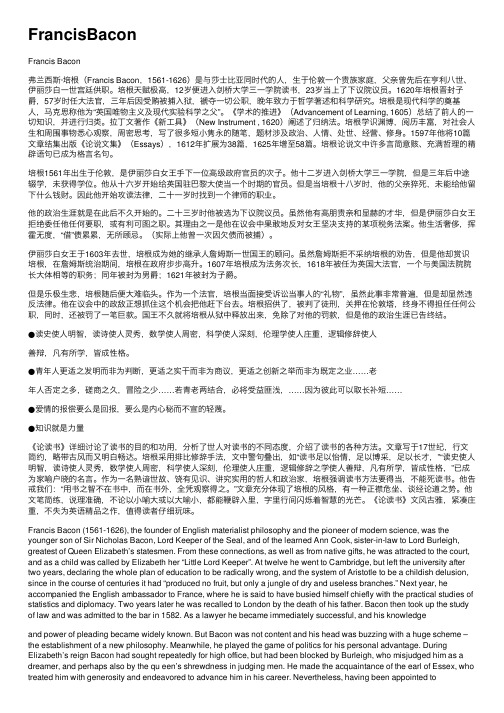
FrancisBaconFrancis Bacon弗兰西斯·培根(Francis Bacon,1561-1626)是与莎⼠⽐亚同时代的⼈,⽣于伦敦⼀个贵族家庭,⽗亲曾先后在亨利⼋世、伊丽莎⽩⼀世宫廷供职。
培根天赋极⾼,12岁便进⼊剑桥⼤学三⼀学院读书,23岁当上了下议院议员。
1620年培根晋封⼦爵,57岁时任⼤法官,三年后因受贿被捕⼊狱,褫夺⼀切公职,晚年致⼒于哲学著述和科学研究。
培根是现代科学的奠基⼈,马克思称他为“英国唯物主义及现代实验科学之⽗”。
《学术的推进》(Advancement of Learning, 1605)总结了前⼈的⼀切知识,并进⾏归类。
拉丁⽂著作《新⼯具》(New Instrument , 1620)阐述了归纳法。
培根学识渊博,阅历丰富,对社会⼈⽣和周围事物悉⼼观察,周密思考,写了很多短⼩隽永的随笔,题材涉及政治、⼈情、处世、经营、修⾝。
1597年他将10篇⽂章结集出版《论说⽂集》(Essays),1612年扩展为38篇,1625年增⾄58篇。
培根论说⽂中许多⾔简意赅、充满哲理的精辟语句已成为格⾔名句。
培根1561年出⽣于伦敦,是伊丽莎⽩⼥王⼿下⼀位⾼级政府官员的次⼦。
他⼗⼆岁进⼊剑桥⼤学三⼀学院,但是三年后中途辍学,未获得学位。
他从⼗六岁开始给英国驻巴黎⼤使当⼀个时期的官员。
但是当培根⼗⼋岁时,他的⽗亲猝死,未能给他留下什么钱财。
因此他开始攻读法律,⼆⼗⼀岁时找到⼀个律师的职业。
他的政治⽣涯就是在此后不久开始的。
⼆⼗三岁时他被选为下议院议员。
虽然他有⾼朋贵亲和显赫的才华,但是伊丽莎⽩⼥王拒绝委任他任何要职,或有利可图之职。
其理由之⼀是他在议会中果敢地反对⼥王坚决⽀持的某项税务法案。
他⽣活奢侈,挥霍⽆度,“借”债累累,⽆所顾忌。
(实际上他曾⼀次因⽋债⽽被捕)。
伊丽莎⽩⼥王于1603年去世,培根成为她的继承⼈詹姆斯⼀世国王的顾问。
虽然詹姆斯拒不采纳培根的劝告,但是他却赏识培根,在詹姆斯统治期间,培根在政府步步⾼升。
弗朗西斯·培根
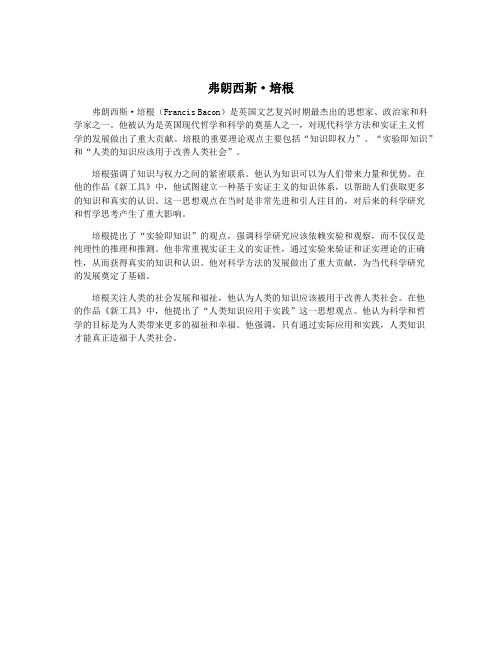
弗朗西斯·培根
弗朗西斯·培根(Francis Bacon)是英国文艺复兴时期最杰出的思想家、政治家和科学家之一。
他被认为是英国现代哲学和科学的奠基人之一,对现代科学方法和实证主义哲
学的发展做出了重大贡献。
培根的重要理论观点主要包括“知识即权力”、“实验即知识”和“人类的知识应该用于改善人类社会”。
培根强调了知识与权力之间的紧密联系。
他认为知识可以为人们带来力量和优势。
在
他的作品《新工具》中,他试图建立一种基于实证主义的知识体系,以帮助人们获取更多
的知识和真实的认识。
这一思想观点在当时是非常先进和引人注目的,对后来的科学研究
和哲学思考产生了重大影响。
培根提出了“实验即知识”的观点,强调科学研究应该依赖实验和观察,而不仅仅是
纯理性的推理和推测。
他非常重视实证主义的实证性,通过实验来验证和证实理论的正确性,从而获得真实的知识和认识。
他对科学方法的发展做出了重大贡献,为当代科学研究
的发展奠定了基础。
培根关注人类的社会发展和福祉,他认为人类的知识应该被用于改善人类社会。
在他
的作品《新工具》中,他提出了“人类知识应用于实践”这一思想观点。
他认为科学和哲
学的目标是为人类带来更多的福祉和幸福。
他强调,只有通过实际应用和实践,人类知识
才能真正造福于人类社会。
培 根 随 笔

弗兰西斯· 培根(Francis Bacon ,1561—1626) 是英国哲学家和科学家。他竭力倡导“读史使人明智, 读诗使人灵秀,数学使人周密,科学使人深刻,伦理学 使人庄重,逻辑修辞之学使人善辩”。他推崇科学、发 展科学的进步思想和崇尚知识的进步口号,一直推动着 社会的进步。这位一生追求真理的思想家,被马克思称 为“英国唯物主义和整个现代实验科学的真正始祖”。 伯特兰· 罗素说他是近代归纳法的创始人,《培根随笔 集》是他的代表作,也是西方名著中的经典著作。他在 逻辑学、美学、教育学方面也提出许多思想。著有《新 工具》、《论说随笔文集》等。后者收入58篇随笔,从 各个角度论述广泛的人生问题,精妙、有哲理,拥有很 多读者。但同时,培根也是一个男权、贵族、功利主义 者。 著有《学术的进步》(1605)和《新工具》(1620)
6、合理安排时间,就等于节约时间 7、习惯真是一种顽强而巨大的力量,它可 以主宰人的一生,因此,人从幼年起就应该 通过教育培养一种良好的习惯。 8、习惯真是一种顽强而巨大的力量,它可 以主宰人生。因此,人自幼就应该通过完美 的教育,去建立一种好的习惯。 9.既然习惯是人生的主宰,人们就应当努力 求得好的习惯。习惯如果是在幼年就起始的, 那就是最完美的习惯,这是一定的,这个我 们叫做教育。教育其实是一种从早年就起始 的习惯。
培根随笔
内容简介:《培根随笔》为英国十七世纪著名思想家, 政治家和经验主义哲学家弗兰西斯· 培根所著.本书分为 《论求知》,《论美》,《论善》,《论真理》,《论 健康》,《论家庭》,《论友谊》等多篇随笔. 《培根随笔》是英国随笔文学的开山之作,以其简 洁的语言、优美的文笔、透彻的说理、迭出的警句,在 世界文学史上占据了非常重要的地位,“读之犹如聆听 高人赐教,受益匪浅”。被译成多种文字出版,至今畅 销不衰。1985年被美国《生活》杂志评选为“人类有 史以来的20种最佳书”之一;同年入选美国《优良读物 指南》的推荐书目。
- 1、下载文档前请自行甄别文档内容的完整性,平台不提供额外的编辑、内容补充、找答案等附加服务。
- 2、"仅部分预览"的文档,不可在线预览部分如存在完整性等问题,可反馈申请退款(可完整预览的文档不适用该条件!)。
- 3、如文档侵犯您的权益,请联系客服反馈,我们会尽快为您处理(人工客服工作时间:9:00-18:30)。
Francis Bacon and His WorksFrancis BaconFrancis Bacon(1561—1626)was one of the leading figures in natural philosophy and in the field of scientific methodology in the period of transition from the Renaissance to the early modern era.He studied at Cambridge (Trinity College) and Gray's Inn, entered Parliament, and gradually established his reputation, but made little progress during Elizabeth's reign.WorksFrancis Bacon left vast and varied writings, which might be divided into three great branches:Scientifical works — in which his ideas for an universal reform of knowledge, scientific method and the improvement of mankind's state are presented.Religious/literary works — in which he presents his moral philosophy and theological meditations. Juridical works — in which his reforms in Law are proposed.ContributionsFrancis Bacon had made great contributions on Literature, Philosophy, Science, law and art. Literature:Francis Bacon’s literatur al work mostly are proses and essays. There are some features of Bacon's essays: ①the language is very neat, pretty and weighty. ②the sentences are very short. Bacon also likes to use more co-ordinate conjunctions than the subordinated ones, such as "as, since, because". ③the devices are parallelism, epigrams(警句), metaphor,and simile.And his most important work is Essay, which was regarded as one of the greatest prose works in the world for its brevity, compactness and powerfulness. Essay covers a wide variety of subjects, such as love, truth, friendship, politics, economy, religion, beauty, studies, and marriage.Of TruthⅠ Brief Introduction●First published in 1625●Francis Bacon declares that truth in the philosophical and theological sense, as well as honesty in thecivil business sense, are the "sovereign good of human nature."Ⅱ Background Information“What is truth?” said jesting Pilate (Full name: Pontius Pilate)●According to the new testament scripture, at first, Pilate thinks Jesus is innocent, for he had questionedJesus for many times. But under the pressure of the jewish religious leaders, Jesus was sentenced to death.●In the conversation between Pilate and Jesus, Pilate asked,''what have you done?'' Then, Pilateasked:“What is truth?”●Actually Pilate knew Jesus was innocent but he still asked , “What is truth” . At that time a lot of peoplelike Pilate, they do know what is truth but they pretend they don’t know .●Bacon uses this Bible story to introduce his topic——truth. He wants to tell people what is truth andwhat attitude should we take towards truth.Ⅲ TopicThe inquiry of truth, which is the love-making or wooing of it, the knowledge of truth, which is the presence of it, and the belief of truth, which is the enjoying of it, is the sovereign good of human nature.Ⅳ Sentences Analysis1. “But it is not only the difficulty and labor, which men take in finding out of truth, nor again, that when it is found, it imposeth upon men's thoughts, that doth bring lies in favor; but a natural though corrupt love, of the lie itself.”●Up to this point Bacon is saying there are few philosophical skeptics left but humans still prefer thefreedom to choose their own views over the hard work of pursuing truth especially since they consider truth constricting.2. No advantageBacon writes “One of the later school of the Grecians, examineth the matter, and is at a stand, to think what should be in it, that men should love lies; where neither they make for pleasure, as with poets, nor for advantage, as with the merchant; but for the lie's sake.”3. AdvantagesBacon writes “A mixture of a lie doth ever add pleasure. Doth any man doubt, that if there were taken out of men's minds, vain opinions, flattering hopes, false valuations, imaginations as one would, and the like”4. DisadvantagesBacon writes “but it would leave the minds, of a number of men, poor shrunken things, full of melancholy and indisposition, and unpleasing to themselves?”5. “truth, which only doth judge itself, teacheth that the inquiry of truth, which is the love-making, or wooing of it,”●“yet truth, which only doth judge itself” means that “that truth seeking faculty is the sole judge of truth.”●In “the love-making, or wooing of it” Bacon means the happy match between the mind of man and thenature of things.”6. “The first creature of God, in the works of the days, was the light of the sense; the last, was the light of reason.”●Bacon believed that God gave us our senses to determine truth be he also believed God gave us theability to reason to determine truth.Ⅴ Beautiful Sentences1.But I cannot tell; this same truth, is a naked, and open day-light, that doth not show the masks, and mummeries, and triumphs, of the world, half so stately and daintily as candle-lights.余亦难言究竟,唯思真理犹如白日无遮之光,直照人世之歌舞庆典,不如烛光掩映,反能显其堂皇之美。
